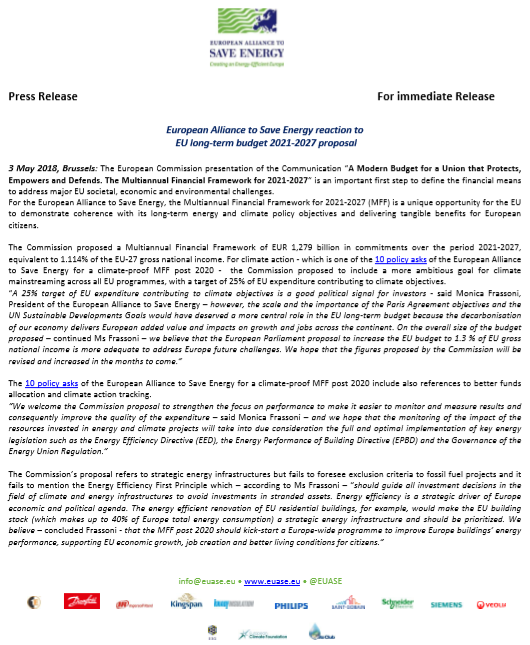
3 May 2018, Brussels. The European Commission presentation of the Communication “A Modern Budget for a Union that Protects, Empowers and Defends. The Multiannual Financial Framework for 2021-2027” is an important first step to define the financial means to address major EU societal, economic and environmental challenges. For the European Alliance to Save Energy, the Multiannual Financial Framework for 2021-2027 (MFF) is a unique opportunity for the EU to demonstrate coherence with its long-term energy and climate policy objectives and delivering tangible benefits for European citizens.
The Commission proposed a Multiannual Financial Framework of EUR 1,279 billion in commitments over the period 2021-2027, equivalent to 1.114% of the EU-27 gross national income. For climate action – which is one of the 10 policy asks of the European Alliance to Save Energy for a climate-proof MFF post 2020 – the Commission proposed to include a more ambitious goal for climate mainstreaming across all EU programmes, with a target of 25% of EU expenditure contributing to climate objectives. “A 25% target of EU expenditure contributing to climate objectives is a good political signal for investors – said Monica Frassoni, President of the European Alliance to Save Energy – however, the scale and the importance of the Paris Agreement objectives and the UN Sustainable Developments Goals would have deserved a more central role in the EU long-term budget because the decarbonisation of our economy delivers European added value and impacts on growth and jobs across the continent. On the overall size of the budget proposed – continued Ms Frassoni – we believe that the European Parliament proposal to increase the EU budget to 1.3 % of EU gross national income is more adequate to address Europe future challenges. We hope that the figures proposed by the Commission will be revised and increased in the months to come.”
The 10 policy asks of the European Alliance to Save Energy for a climate-proof MFF post 2020 include also references to better funds allocation and climate action tracking. “We welcome the Commission proposal to strengthen the focus on performance to make it easier to monitor and measure results and consequently improve the quality of the expenditure – said Monica Frassoni – and we hope that the monitoring of the impact of the resources invested in energy and climate projects will take into due consideration the full and optimal implementation of key energy legislation such as the Energy Efficiency Directive (EED), the Energy Performance of Building Directive (EPBD) and the Governance of the Energy Union Regulation.”
The Commission’s proposal refers to strategic energy infrastructures but fails to foresee exclusion criteria to fossil fuel projects and it fails to mention the Energy Efficiency First Principle which – according to Ms Frassoni – “should guide all investment decisions in the field of climate and energy infrastructures to avoid investments in stranded assets. Energy efficiency is a strategic driver of Europe economic and political agenda. The energy efficient renovation of EU residential buildings, for example, would make the EU building stock (which makes up to 40% of Europe total energy consumption) a strategic energy infrastructure and should be prioritized. We believe – concluded Frassoni – that the MFF post 2020 should kick-start a Europe-wide programme to improve Europe buildings’ energy performance, supporting EU economic growth, job creation and better living conditions for citizens.”
